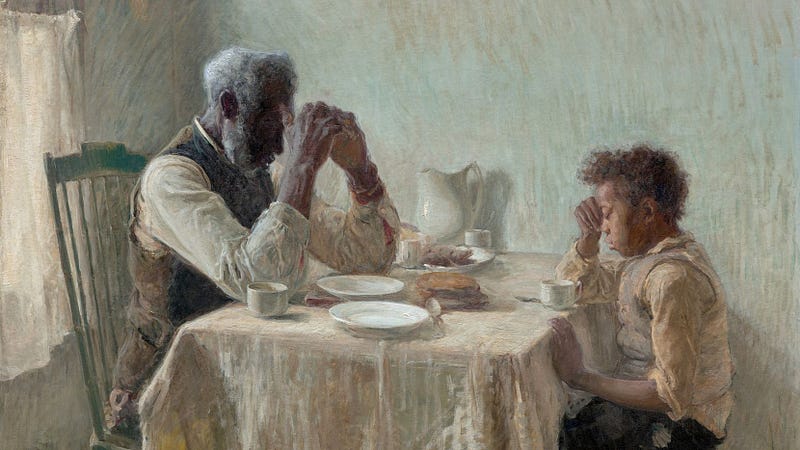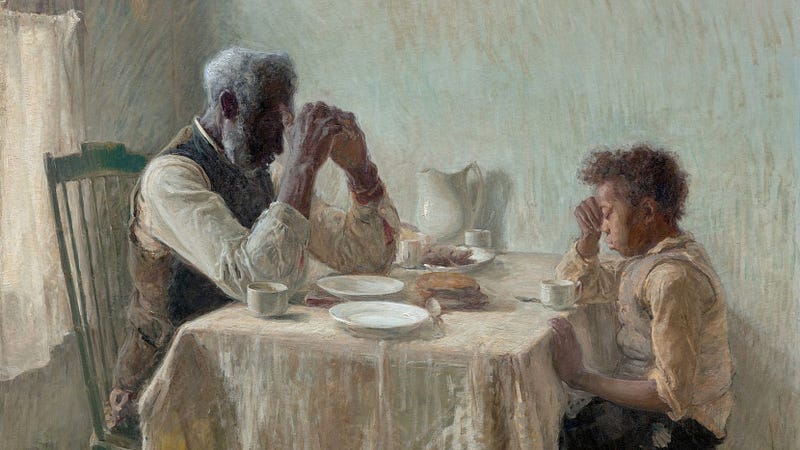A Thanksgiving Day Homily
It is easy to give thanks when our blessings are obvious but not so easy in the midst of difficulties. But it is precisely during times of trouble when it is most important for us to pause, recall our blessings, and express our gratitude to God.
I’ve never been one to get too excited about secular holidays, but one I do really appreciate is Thanksgiving. Out of all of them, this one most directly expresses that central Christian attitude of gratitude. One of the core teachings of our faith — one that we often overlook — is to be grateful at all times for the blessings God has given us.
The scriptures are full of injunctions for us to give thanks. In the Old Testament, we read in Isaiah to “give thanks to the Lord, acclaim his name; among all nations make known his deeds” (Is 12:4). The Psalms instruct us to “give thanks to the Lord for he is good, his love is everlasting” (Ps 118:1).
This theme is emphasized even more in the New Testament. In the gospels, Jesus admonishes the nine lepers who were cured and did not offer thanks to God for their blessing (Lk 17:11–19). In his first letter to the Thessalonians, St. Paul teaches that it is the will of God that we give thanks in all circumstances (1 Thess 5:18). All circumstances. It’s easy for us to feel thankful when things are going well for us, but being thankful in difficult times is… well, difficult. Yet this is precisely what we are called to do.
St. Paul gives us what I think is a good example of this in the opening to his first letter to the Corinthians. If you know anything about Paul’s letters to the Corinthians you know that they are corrective letters. The Church in Corinth was a troubled church. Things were not well there. They were going astray in all kinds of ways, broken up into various factions. No doubt they were the cause of much stress and concern for Paul and the other Apostles. But notice how Paul chooses to begin his corrective letter of admonishment to them: “I give thanks to my God always on your account” (1 Cor 1:4).
Having an attitude of gratitude even in hard times is the secret to knowing the peace and joy that Christ offers. Remember, Jesus never promises that his followers will have easy, care-free lives. But he does promise peace and joy.
Giving thanks in hard times is indeed the very purpose of this national holiday. This Day of Thanksgiving was established at a time when our country was literally tearing itself apart. In October of 1863, “in the midst of a civil war of unequaled magnitude and severity,” as he put it, President Abraham Lincoln declared that the last Thursday in November be kept “as a day of thanksgiving and praise to our beneficent Father who dwelleth in the heavens.”
And what most Americans think of as the first Thanksgiving — the meal shared between the Plymouth colonists and the Wampanoag tribe in 1621 to celebrate a successful corn harvest — came after a brutal winter during which over half of the colonists died.
For Catholics, the concept of thanksgiving is fundamentally tied to our worship of God. In most all ancient societies the worship of the gods was made through sacrifice, but usually those sacrifices were about appeasing the gods. In the Jewish tradition, however, the idea of sacrifice was more about offering thanks to God for his blessings. We see this going all the way back to the sacrifice of Abel the just, offering the first fruits of his livestock. The sacrifice of bread and wine by Melchizedek was offered in thanksgiving for Abram’s victory. The great Passover sacrifice was renewed each year in thanksgiving for being liberated from slavery in Egypt.
The greatest sacrifice of all, Jesus’ offering of himself to God the Father on the cross for our salvation is the perfect act of thanksgiving. That’s why we call our participation in that sacrifice Eucharist — the Greek word for “thanksgiving.” It’s worth noting that this thanksgiving meal was instituted by Christ when he was on the cusp of his Passion. Even knowing all that he was about to suffer in the coming hours, our Lord took bread, gave thanks, broke it, and shared it with his disciples (cf. 1 Cor 11:23–24).
So the idea of gathering together with loved ones around a table to celebrate a ritual meal of thanksgiving — even when times are tough — is nothing new to Catholics. We’ve been doing it for two thousand years. It’s part of our Catholic DNA.
“In all circumstances, give thanks.” It is easy to give thanks when our blessings are obvious but not so easy in the midst of difficulties. But it is precisely during times of trouble when it is most important for us to pause, recall our blessings, and express our gratitude to God.
God bestows blessings upon each one of us; not just a special few. It doesn’t matter whether we are Gentile or Jew, Christian or non-Christian, believer or atheist. It doesn’t matter if we are rich or poor, black or white, male or female. Regardless of whether we are righteous or unrighteous, the scriptures say that God makes the sun shine and the rain fall on the bad and good alike (Mt 5:45). Each and every one of us has been blessed by God more than we realize. The fact that we exist at all is a greater gift than we deserve. God has given us the very air that we breathe, the blood that pumps through our veins, and a new day in which to begin again.
The question is not whether God has blessed us; the question is how do we receive his blessings. Do we ignore them? Do we take them for granted? Do we resent them? Reject them? Complain that they are not enough and that we deserve better? Or do we accept them with a thankful heart?
This Thanksgiving, let us recall the many blessings God has bestowed and continues to bestow upon us, even amidst the chaos of this world, mindful that the greatest blessing of all is the gift of salvation in His Son, Jesus Christ. This blessing is available to us always, no matter what our circumstances may be. The fullness of that blessing may only be realized in the world to come, but our gratitude for it in this world right now is our surest source of peace.
Jesus knew, even as he hung from the cross, the truth expressed by St. Paul in Romans 8:28, that “God works all things for the good of those who love him.” St. Paul himself was happy to suffer for the gospel, knowing that everything that happened to him — his imprisonment, his poverty, his infirmities, and even being shipwrecked! — was something God was able, in his divine providence, to work for good and for the salvation of souls. This faith enabled St. Paul to give thanks in all circumstances of his life.
The martyrs understood this, which is why they are able to paradoxically rejoicing in their suffering. Today also happens to be the memorial of St. Andrew Dung-Lac and companions, the 117 Vietnamese martyrs. One of them, St. Paul Le-Bao-Tinh, wrote a letter from the prison where he was being held and tortured. He describes it as the perfect image of hell. Yet he describes himself as being full of joy and gladness because Christ is with him. He tells those to whom he is writing, “as you hear all these things may you give endless thanks in joy to God, from whom every good proceeds; bless the Lord with me, for his mercy is forever.”
As Catholics, we say that we are a Eucharistic people — that means we are a Thanksgiving people. To call ourselves a Eucharistic people refers both to our sacramental communion with Christ and our ability to offer thanks to God in all circumstances. One feeds into the other. We need to remember that.
Even the secular world affirms that giving thanks is good for us. Recent psychological research finds that “gratitude is strongly and consistently associated with greater happiness.” According to a 2021 report from the Harvard Medical School, “Gratitude helps people feel more positive emotions, relish good experiences, improve their health, deal with adversity, and build strong relationships.”
So if you are looking for a quick and easy way to both boost your spiritual life and improve your mental health, try to find five things each day to be thankful for. It’s easier than you think, once you take the time to stop and appreciate God’s blessings in all their forms. Let’s all commit ourselves to really live out the words of holy scripture: “In all circumstances, give thanks, for this is the will of God for you in Christ Jesus” (1 Thess 5:18).




